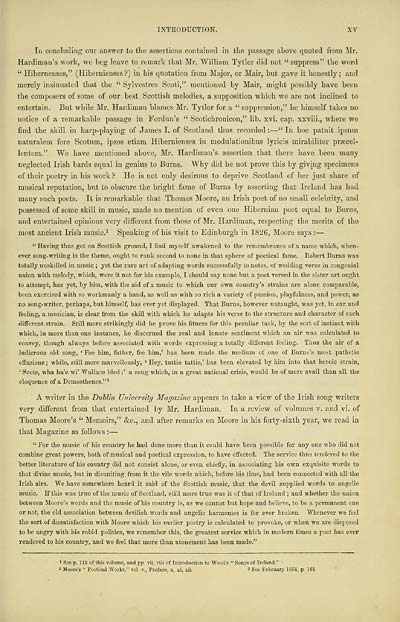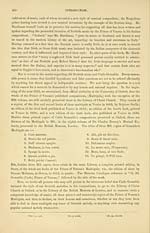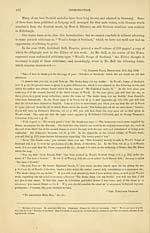Glen Collection of printed music > Printed music > Wood's edition of the songs of Scotland
(23) Page xv
Download files
Complete book:
Individual page:
Thumbnail gallery: Grid view | List view

INTRODUCTION. XV
In concluding our answer to the assertions contained in the passage above quoted from Mr.
Harditnan's work, we beg leave to remark that Mr. William Tytler did not " suppress" the word
" Hibernenses," (Hibernienses?) in his quotation from Major, or Mair, but gave it honestly ; and
merely insinuated that the " Sylvestres Scoti," mentioned by Mair, might possibly have been
the composers of some of our best Scottish melodies, a supposition which we are not inclined to
entertain. But while Mr. Hardiman blames Mr. Tytler for a " suppression," he himself takes no
notice of a remarkable passage in Fordun's " Scotichronicon," lib. xvi. cap. xxviii., where we
find the skill in harp-playing of James I. of Scotland thus recorded : — " In hoc patuit ipsum
naturalem fore Scotum, ipsos etiam Hibernienses in modulationibus lyricis mirabiliter prrecel-
lentem." We have mentioned above, Mr. Hardiman's assertion that there have been many
neglected Irish bards equal in genius to Burns. Why did he not prove this by givhig specimens
of their poetry in his work? He is not only desirous to deprive Scotland of her just share of
musical reputation, but to obscure the bright fame of Burns by asserting that Ireland has had
many such poets. It is remarkable that Thomas Moore, an Irish poet of no small celebrity, and
possessed of some skill in music, made no mention of even one Hibernian poet equal to Burns,
and entertained opinions very different from those of Mr. Hardiman, respecting the merits of the
most ancient Irish music. 1 Speaking of his visit to Edinburgh in 1826, Moore says : —
"Having thus got on Scottish ground, I find myself awakened to the remembrance of a name which, when-
ever song-writing is the theme, ought to rank second to none in that sphere of poetical fame. Robert Burns was
totally unskilled in music ; yet the rare art of adapting words successfully to notes, of wedding verse in congenial
union with melody, which, were it not for his example, I should say none but a poet versed in the sister art ought
to attempt, has yet, by him, with the aid of a music to which our own country's strains are alone comparable,
been exercised with so workmanly a hand, as well as with so rich a variety of passion, playfulness, and power, as
no song-writer, perhaps, but himself, has ever yet displayed. That Burns, however untaught, was yet, in ear and
feeling, a musician, is clear from the skill with which he adapts his verse to the structure and character of each
different strain. Still more strikingly did he prove his fitness for this peculiar task, by the sort of instinct with
which, in more than one instance, he discerned the real and innate sentiment which an air was calculated to
convey, though always before associated with words expressing a totally different feeling. Thus the air of a
ludicrous old song, ' Fee him, father, fee him,' has been made the medium of one of Burns's most pathetic
effusions ; while, still more marvellously, ' Hey, tuttie tattie,' has been elevated by him into that heroic strain,
' Scots, wha ha'e wi' Wallace bled ;' a song which, in a great national crisis, would be of more avail than all the
eloquence of a Demosthenes." 8
A writer in the Dublin University Magazine, appears to take a view of the Irish song writers
very different from that entertained by Mr. Hardiman. In a review of volumes v. and vi. of
Thomas Moore's " Memoirs," &c, and after remarks on Moore in his forty-sixth year, we read in
that Magazine as follows : —
" For the music of his country he had done more than it could have been possible for any one who did not
combine great powers, both of musical and poetical expression, to have effected. The service thus tendered to the
better literature of his country did not consist alone, or even chiefly, in associating his own exquisite words to
that divine music, but in disuniting from it the vile words which, before his time, had been connected with all the
Irish airs. We have somewhere heard it said of the Scottish music, that the devil supplied words to angelic
music. If this was true of the music of Scotland, still more true was it of that of Ireland ; and whether the union
between Moore's words and the music of his country is, as we cannot but hope and believe, to be a permanent one
or not, the old association between devilish words and angelic harmonies is for ever broken. Whenever we feel
the sort of dissatisfaction with Moore which his earlier poetry is calculated to provoke, or when we are disposed
to be angry with his rabid politics, we remember this, the greatest service which in modern times a poet has ever
rendered to his country, and we feel that more than atonement has been made."
1 See p. 115 of this volume, and pp. vii, viii of Introduction to Wood's " Songs of Ireland."
2 Moore's " Poetical Works," vol. v., Preface, x. li, xii. 3 For February 1854, p. 161.
In concluding our answer to the assertions contained in the passage above quoted from Mr.
Harditnan's work, we beg leave to remark that Mr. William Tytler did not " suppress" the word
" Hibernenses," (Hibernienses?) in his quotation from Major, or Mair, but gave it honestly ; and
merely insinuated that the " Sylvestres Scoti," mentioned by Mair, might possibly have been
the composers of some of our best Scottish melodies, a supposition which we are not inclined to
entertain. But while Mr. Hardiman blames Mr. Tytler for a " suppression," he himself takes no
notice of a remarkable passage in Fordun's " Scotichronicon," lib. xvi. cap. xxviii., where we
find the skill in harp-playing of James I. of Scotland thus recorded : — " In hoc patuit ipsum
naturalem fore Scotum, ipsos etiam Hibernienses in modulationibus lyricis mirabiliter prrecel-
lentem." We have mentioned above, Mr. Hardiman's assertion that there have been many
neglected Irish bards equal in genius to Burns. Why did he not prove this by givhig specimens
of their poetry in his work? He is not only desirous to deprive Scotland of her just share of
musical reputation, but to obscure the bright fame of Burns by asserting that Ireland has had
many such poets. It is remarkable that Thomas Moore, an Irish poet of no small celebrity, and
possessed of some skill in music, made no mention of even one Hibernian poet equal to Burns,
and entertained opinions very different from those of Mr. Hardiman, respecting the merits of the
most ancient Irish music. 1 Speaking of his visit to Edinburgh in 1826, Moore says : —
"Having thus got on Scottish ground, I find myself awakened to the remembrance of a name which, when-
ever song-writing is the theme, ought to rank second to none in that sphere of poetical fame. Robert Burns was
totally unskilled in music ; yet the rare art of adapting words successfully to notes, of wedding verse in congenial
union with melody, which, were it not for his example, I should say none but a poet versed in the sister art ought
to attempt, has yet, by him, with the aid of a music to which our own country's strains are alone comparable,
been exercised with so workmanly a hand, as well as with so rich a variety of passion, playfulness, and power, as
no song-writer, perhaps, but himself, has ever yet displayed. That Burns, however untaught, was yet, in ear and
feeling, a musician, is clear from the skill with which he adapts his verse to the structure and character of each
different strain. Still more strikingly did he prove his fitness for this peculiar task, by the sort of instinct with
which, in more than one instance, he discerned the real and innate sentiment which an air was calculated to
convey, though always before associated with words expressing a totally different feeling. Thus the air of a
ludicrous old song, ' Fee him, father, fee him,' has been made the medium of one of Burns's most pathetic
effusions ; while, still more marvellously, ' Hey, tuttie tattie,' has been elevated by him into that heroic strain,
' Scots, wha ha'e wi' Wallace bled ;' a song which, in a great national crisis, would be of more avail than all the
eloquence of a Demosthenes." 8
A writer in the Dublin University Magazine, appears to take a view of the Irish song writers
very different from that entertained by Mr. Hardiman. In a review of volumes v. and vi. of
Thomas Moore's " Memoirs," &c, and after remarks on Moore in his forty-sixth year, we read in
that Magazine as follows : —
" For the music of his country he had done more than it could have been possible for any one who did not
combine great powers, both of musical and poetical expression, to have effected. The service thus tendered to the
better literature of his country did not consist alone, or even chiefly, in associating his own exquisite words to
that divine music, but in disuniting from it the vile words which, before his time, had been connected with all the
Irish airs. We have somewhere heard it said of the Scottish music, that the devil supplied words to angelic
music. If this was true of the music of Scotland, still more true was it of that of Ireland ; and whether the union
between Moore's words and the music of his country is, as we cannot but hope and believe, to be a permanent one
or not, the old association between devilish words and angelic harmonies is for ever broken. Whenever we feel
the sort of dissatisfaction with Moore which his earlier poetry is calculated to provoke, or when we are disposed
to be angry with his rabid politics, we remember this, the greatest service which in modern times a poet has ever
rendered to his country, and we feel that more than atonement has been made."
1 See p. 115 of this volume, and pp. vii, viii of Introduction to Wood's " Songs of Ireland."
2 Moore's " Poetical Works," vol. v., Preface, x. li, xii. 3 For February 1854, p. 161.
Set display mode to: Large image | Transcription
Images and transcriptions on this page, including medium image downloads, may be used under the Creative Commons Attribution 4.0 International Licence unless otherwise stated. ![]()
| Special collections of printed music > Glen Collection of printed music > Printed music > Wood's edition of the songs of Scotland > (23) Page xv |
|---|
| Permanent URL | https://digital.nls.uk/91338019 |
|---|
| Description | Scottish songs and music of the 18th and early 19th centuries, including music for the Highland bagpipe. These are selected items from the collection of John Glen (1833 to 1904). Also includes a few manuscripts, some treatises, and other books on the subject. |
|---|
| Description | The Glen Collection and the Inglis Collection represent mainly 18th and 19th century Scottish music, including Scottish songs. The collections of Berlioz and Verdi collected by bibliographer Cecil Hopkinson contain contemporary and later editions of the works of the two composers Berlioz and Verdi. |
|---|

